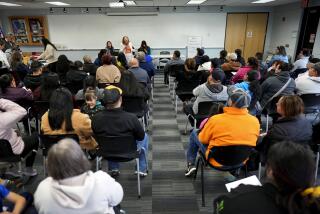Iowa takes its role as first presidential vetter very seriously
The memo leaked in the spring of 2007. A deputy campaign manager for Hillary Rodham Clinton urged her to skip the Iowa caucuses in her quest for the Democratic presidential nomination. Participating in the first contest of the 2008 presidential calendar, he wrote, was expensive, outdated and unnecessary.
Iowans, who take their role as first presidential vetters seriously, were not amused. Clinton scrambled into damage-control mode. But she’d violated an unwritten Iowa rule: Never, ever, give voice to the idea that Iowa is not the center of the political universe.
As the 2012 presidential season warms up, aspiring nominees have launched their efforts in the quadrennial wooing of Iowa’s notoriously demanding voters. The caucuses — more than 1,700 small gatherings in living rooms, schools and libraries around the state — are tentatively set for early February.
With the Democratic incumbent in the White House facing no serious challenger from his own party, it is Republican candidates who will roam from Des Moines to Davenport to Dubuque over the next seven months. In coffee shops, cornfields and backyards, they will endeavor to win over voters, one small gathering at a time. And as they do, they will navigate the minefield that is the tacit Code of the Caucus. Intentionally or accidentally transgressing the rules can cost voter support — Clinton finished third — or incur lasting ridicule.
Take a certain suave U.S. senator from Illinois, standing next to an Iowa cornfield in July 2007.
“Anybody gone into Whole Foods lately and see what they charge for arugula?” said Barack Obama, who with one flippant remark undid months of careful man-of-the-people rhetoric. “I mean, they’re charging a lot of money for this stuff.”
Yeah, maybe on the Upper West Side.
“Most Iowans sat there and said, ‘Whaaaa?’ Their eyes glazed over,” said Dianne Bystrom, director of Iowa State University’s Center for Women and Politics. “They didn’t know what Whole Foods was, and they didn’t know what arugula was. He should’ve been talking about Iowa sweet corn. At the local Fairway.” (Iowa will not get a Whole Foods Market until next spring.) Obama hit the doldrums after that, and supporters began wondering why he wasn’t able to connect with voters.
The campaign code is about authenticity, Iowa style. “You have to talk, look and act like an Iowan,” Bystrom said. “Genuine, humble, of the people.... We notice what kind of shoes you wear.”
Those who turn out on caucus night are overwhelmingly white, generally older than 45 and constitute only a sliver of eligible voters. An estimated 60% of Iowa Republicans identify themselves as evangelical Christians. In 2008, an unprecedented number of young Democratic voters energized by the youthful Obama turned out, but no one expects a repeat in 2012.
The voters here are direct and, though generally polite, don’t shy away from confrontation. Newt Gingrich found that out a few weeks ago, when, after he criticized fellow Republican Paul Ryan’s plan for Medicare reform, a Fox News camera caught an exchange between him and an Iowa voter.
“What you just did to Paul Ryan is unforgivable,” said the man.
Gingrich, appearing rattled, came across as defensive: “I didn’t do anything to Paul Ryan.”
Iowa’s brand of retail politicking has become ritual since 1972, when Iowa Democrats moved up the date of their caucuses. Four years later, the Republicans followed suit, and the first-in-the-nation status focused attention on the arcane nominating event.
Since then, Iowans have wielded their position on the calendar to demand an intimacy with presidential hopefuls rivaled only by the down-to-earth voters of New Hampshire, whose traditional first primary is currently scheduled about a week later.
In both places, you can stretch the political truth, but you must keep your local facts straight. Iowa Republicans were paying close attention recently when Minnesota Rep. Michele Bachmann an Iowa native, mistakenly placed Lexington and Concord in New Hampshire instead of Massachusetts.
“Makes you wince,” said Chuck Laudner, a GOP activist from Rockford, Iowa.
Sometimes the code is a matter of simple etiquette. Whether a candidate is in Manchester, N.H., or Mason City, Iowa, he or she must maintain eye contact while meeting a voter.
“If they are shaking your hand, but already looking at the next person, that’s a mistake, that means they don’t really feel like they want to be there,” Laudner said. “Newt [Gingrich] has a tendency to do that.”
A big entourage may work in Hollywood, but it irks Iowans.
“That was one of the real criticisms of Hillary,” said Des Moines political consultant Bob Haus. “She had a big bubble. That prevents people from getting to you.”
His wife, Ruth Haus, added: “Part of it is we are so spoiled, we are used to having such access and anything that creates a barrier to that is off-putting. It’s almost not fair because in any other state, a lot of those things would be OK. Here we are just really picky. Well, discerning.”
Despite its outsized influence and attendant publicity, the caucus system has many detractors. Many think that Iowa, with its white, rural population, is not representative of contemporary America, and has no business wielding such influence in the presidential race. Also, caucuses take place in the evening at a set time; so absentee balloting is not an option. At the appointed time, Republicans vote by secret ballot, Democrats literally stand up for their candidates.
Some people, especially in states that come later in the primary calendar, resent the attention and money lavished on Iowans, who don’t have to make a judgment about a candidate based on a TV or radio spot because they have so many opportunities to meet with each one.
And some argue that the caucus system, while weeding out weaker players, does not necessarily predict national success. (See Mike Huckabee, winner of the 2008 GOP caucus.)
Excluding sitting presidents, who usually don’t face a party challenger, since 1972, only half the winners on either side have gone on to win their party’s nomination.
Still, a caucus victory, or loss, is never merely symbolic. A win can confer legitimacy on a dark horse candidate or cement the status of a front runner. A loss can undermine donor confidence and put the brakes on momentum.
But long before the voting takes place, there is the matter of the delicate dance with voters. Missteps come at a cost.
“Be yourself, be comfortable in your own skin because the one thing Iowans can smell from a mile away is inauthenticity,” said Iowa GOP Chairman Matthew Strawn.
Many candidates will zip around Iowa in private planes — deemed efficient, not snooty, because it allows them to cover more territory, and thus meet more voters — but they will inevitably be chauffeured to their events by local volunteers.
Here the code kicks in: “The candidate should sit in the right passenger seat,” said Bob Haus. “Nobody should open the door for them, and they should get out first.”
In 2007, former Sen. Fred D. Thompson’s advisers pleaded with him to bring out the famous red truck that helped solidify his country lawyer persona when he ran for the U.S. Senate in Tennessee in 1996. He refused, preferring instead to travel by black Lincoln.
Iowans are fond of saying money can’t buy success in the caucuses — after all, Huckabee, the former Arkansas governor, won in 2008 after spending about $1.6 million, compared with second-place finisher Mitt Romney’s $9.8 million.
But there is a place where spending counts. “Iowans always want someone else to pick up the tab for the coffee and the pie,” said Karen Fesler, a Republican activist in North Liberty, in eastern Iowa. “The better the food, the more solid the support.”
Also, she said, events must take place in locally owned restaurants: “Not the McDonald’s.”
The code demands participation in two August events, the Iowa State Fair and the Ames Straw Poll. Romney left some Republicans fuming Thursday when he said he would skip the poll, which can gauge a candidate’s organizational strength.
A visit to the fair is fraught with pitfalls. A faux pas there is not easy to live down.
Would-be presidential nominees must eat something on a stick (not arugula) and show or feign fascination at the life-sized butter cow.
Don’t go to the fair in fancy Italian shoes, said Ann Trimble-Ray, a Sioux City GOP county chairwoman, alluding to a news report that once caused some trouble for a candidate.
In August 2007, Fox News reported that Thompson wore Gucci loafers. Even though he held a piglet and met the pork queen, Thompson ended up in a third-place tie with John McCain, the eventual 2008 nominee.
(Gucci-gate has apparently been eating at Thompson ever since. In an April essay in the National Review Online, Thompson wrote that he has never owned any Gucci footwear. A review of video taken that day — and consultation with fashion experts — reveals that the loafers in question were not Gucci. They were Salvatore Ferragamos. Retail: $460, about the same as Guccis.)
“Elite has taken on this negative connotation,” said University of Iowa political scientist Cary R. Covington. “It doesn’t mean high quality, it means upper class, and the American people have always wanted someone ‘of the people.’”
John Kerry, fresh off a Philly cheese steak debacle (he ordered Swiss instead of Cheez Whiz) took flak in 2003 when he ordered a strawberry smoothie. According to the Wall Street Journal, one of his top aides, sensing a fresh round of effete-bashing, barked, “Somebody get a… corn dog in his hand now!”
“Elitism” is a bipartisan pitfall.
Politico reported that Gingrich, the former House speaker, at had one time owed the jeweler Tiffany between as much as $500,000 on a revolving charge account, according to his wife’s federal ethics disclosures. “That’s a two-barreled shotgun for him,” Covington said. “To the social conservatives, it speaks to a kind of ostentatiousness that doesn’t appeal to them. To economic conservatives, he’s not walking the walk that he’s talking.” (The average home price in Iowa is $106,000.)
There’s a corollary to authenticity: No patronizing.
Let’s say you’re a 50-year-old former governor of a large Midwestern state. You aren’t really known for your electrifying personality. Speaking to Iowa College Republicans, you drop in a tortured pop-culture reference hoping to bolster your youth cred.
“We’ve got tragedy in Japan, and we’ve got huge issues unfolding in the Middle East, but there’s one other thing that unfortunately has captured everybody’s imagination and that’s Charlie Sheen,” former Minnesota Gov. Tim Pawlenty told the group in late March. “Now we may not in this room have ‘tiger blood’ like he does, but we do have something else in common with him. There’s gonna be a lot of winning on the Republican side in 2012.”
“So wince-worthy, so cringy,” said Sue Dvorsky, chairman of the Iowa Democratic Party, and thus perhaps not an impartial judge of a Republican misstep.
“If being perceived as being better than people is bad,” Covington said, “then patronizing them is worse.”
More to Read
Sign up for Essential California
The most important California stories and recommendations in your inbox every morning.
You may occasionally receive promotional content from the Los Angeles Times.











